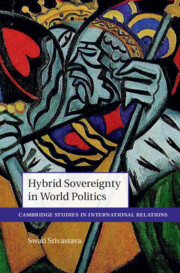Book contents
- Hybrid Sovereignty in World Politics
- Cambridge Studies in International Relations: 161
- Hybrid Sovereignty in World Politics
- Copyright page
- Dedication
- Contents
- Figures
- Tables
- Acknowledgments
- Introduction
- 1 Hybrid Sovereignty in International Theory
- 2 Ideal-Types of Public/Private Hybridity
- 3 Hybrid Sovereign Empire in the English East India Company
- 4 Contracting American Wars through Blackwater
- 5 Institutionalizing Markets through the International Chamber of Commerce
- 6 Shadowing for Human Rights through Amnesty International
- 7 Conclusions on Power and Responsibility in Hybrid Sovereignty
- References
- Index
- Cambridge Studies in International Relations
5 - Institutionalizing Markets through the International Chamber of Commerce
Published online by Cambridge University Press: 01 September 2022
- Hybrid Sovereignty in World Politics
- Cambridge Studies in International Relations: 161
- Hybrid Sovereignty in World Politics
- Copyright page
- Dedication
- Contents
- Figures
- Tables
- Acknowledgments
- Introduction
- 1 Hybrid Sovereignty in International Theory
- 2 Ideal-Types of Public/Private Hybridity
- 3 Hybrid Sovereign Empire in the English East India Company
- 4 Contracting American Wars through Blackwater
- 5 Institutionalizing Markets through the International Chamber of Commerce
- 6 Shadowing for Human Rights through Amnesty International
- 7 Conclusions on Power and Responsibility in Hybrid Sovereignty
- References
- Index
- Cambridge Studies in International Relations
Summary
This chapter examines institutional hybridity in the International Chamber of Commerce’s (ICC) regulatory prowess as the primary organized business interlocutor for intergovernmental bodies in global commerce. The empirics follow various ways in which the ICC embeds itself in global institutions through issue-definition, agenda-setting, and rulemaking. Institutional linkages allow the ICC to organize international markets while boosting the privilege of global corporate elites to reap the benefits of trade and investment at the expense of others. Balancing the legitimacy blowbacks to this elitism is at the core of the politics of institutionalizing rules for global commerce. Moreover, the study of the ICC helps us see that “transnational private authority” need not necessitate a retreat of the state, but rather a recomposition of what it means to regulate across borders. The ICC’s Lived Sovereignty relies fundamentally on the Idealized Sovereignty of governments to keep its institutional status.
Keywords
- Type
- Chapter
- Information
- Hybrid Sovereignty in World Politics , pp. 147 - 184Publisher: Cambridge University PressPrint publication year: 2022

